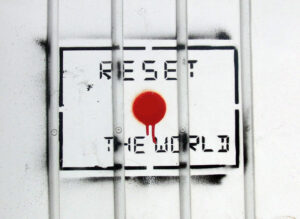
(Photo by Amio Cajander via Flickr)
We have seen many a lurid headline since January, most of them filled with doom, the others counterpunching with prophetic optimism. Have you noticed that one word keeps bouncing back?
Quarantine reset: 5 steps to make you feel more in control …
Governor Cuomo on Calls to Reset National COVID-19 Response …
“The Future Reset: Global Food Systems.”
Reset. That is what we want to come out of this crisis. Not a “transformation,” which has a glowing aura but never works the promised miracle. Not a “reform,” which could be political and painful, or an “overhaul,” which would be expensive and exhausting. Just a “reset,” simple as pushing a button. It takes everything back to a safe place with no problems. Or it neatly realigns, because something has changed and the old way must be brought into sync with the new variables.
A reset has the cheerful feel of a do-over in sports. We reset clocks so we all agree; we reset computers that have gone haywire or blow-dryers flooded with electrical current. We reset priorities.
Six former heads of EPA call for agency reset after Trump term
Malls, eateries press reset button amidst Covid crisis
The post-crisis ‘to-do’ list: reset the online ad market
COVID-19 has the ability to reset aviation…
When nightmare is over, a chance for sports to reset
Why this particular noun/verb? Granted, journalists are lazy. A word catches fire and burns through the forest. A while back it was “parse,” then “fraught,” “deep dive,” “low-hanging fruit.” Suddenly these odd words and phrases would show up everywhere, repeating like an audio glitch.
But “reset” strikes me as more than a buzzword. Or rather, there is a reason it is a buzzword, a ready audience waiting for it in the zeitgeist. So much is in need of fixing. We see this stopped merry-go-round as a chance to do every repair, every bit of deferred maintenance, and add some glossy new painted horses.
We may be expecting too much. At his Dallas church, Pastor Tony Evans even preached about a “divine reset,” suggesting that God allowed this disruption to give us a chance “to reset the culture and the world, and give us another opportunity to come back to him.” Beneath that cosmic overhaul, the flowchart arrows point to various other resets, shifting back and forth between individual and societal. The fashion industry suggests “a beauty reset” and doctors give us tips “to help reset your body” or at least ‘reset your sleep schedule” while pundits analyze “The Great Reset” of social, political, and economic reality.
Sometimes, the word’s usage is practical and fitting: “Boards Reset Executive Pay, Equity Grants During Market Rout.” But then I see headlines like this one—
Silicon Valley Is Forced to Reset its Moral Compass—and have to wonder, should one reset a moral compass? I thought the fixed point was what guided us—our true north. No wonder we are lost.
The word crops up most often in international diplomacy, I notice:
“No, Now Is Not the Time for Another Russia Reset.”
“Crisis offers chance to reset U.S., Russia Relations.”
“Europe and China were on course for a reset.”
“A Pandemic-Prompted Reset to U.S Foreign Policy.”
Nothing is ever as new as it seems, though. Poking around, I find Joe Biden using the word in 2009, quoting President Obama, who picked it up from press coverage of his opponent, Hillary Clinton, and her repeated, well-publicized efforts to reset her campaign. Clinton then used the term herself, as secretary of state, in reference to U.S. relations with Russia. She even presented foreign minister Sergei Lavrov with a fun token of her good intentions, a red “reset button” for his desk.
It is never that easy.
The button read “peregruzka,” which could conceivably have meant reset to a translator but actually meant overcharge. As in, amp up with electricity. Russian president Dmitri Medvedev remarked dryly, “The surprising term ‘reset’ really reflects the essence of the transformations we would like to see.”
What could a reset look like? Lord knows, the ease of it is appealing. Daylight savings annoys me, but I love muttering spring forward, fall back as I troop around the house resetting clocks. For a wrinkle of time, we are wrong, disoriented, cast out from the consensus, and there is that anxious feeling of knowing we could set the alarm wrong or show up somewhere at the wrong time … and then, with the slightest of adjustments, we are back in sync. If we could do that with nature? With the widening gap between rich and poor? With our enemies?
The Institute for the Future lays out three stages in the way humans interpret crisis: disruption, reset, and reinvention. “In working through reset,” the authors note, “a useful strategy is provoking or inspiring deeper curiosity.” Not the panic of disruption, in other words, but a calmer exploration. Why? To show us “where there is agency”—in other words, a chance to direct what happens next, shape a new reality instead of lying helpless on the railroad tracks.
This pandemic is not, the word “reset” reassures us, the apocalypse. Or rather, it is, if we borrow the seventeenth-century meaning of that word: “the end of the world, but with the possibility of renewal.”
“Rise Up for the Great Reset,” Thrive Global tells us in rapturous tones. “Can there be any doubt that a reset of very nearly everything will emerge from this time of contagion and confusion?”
Well, yeah, there can. Arundhati Roy writes that “historically, pandemics have forced humans to break with the past and imagine their world anew.” The time is right. Surfaces already look different: offices moving home, malls closing, Amazon delivering on Sundays, maskmaking the new cottage industry. But most of the tweaks amount to cutting a few checks and moving things outside or online. Reimagining? That requires a great deal more than pressing a button.
